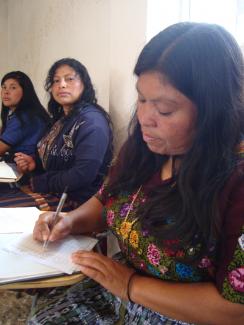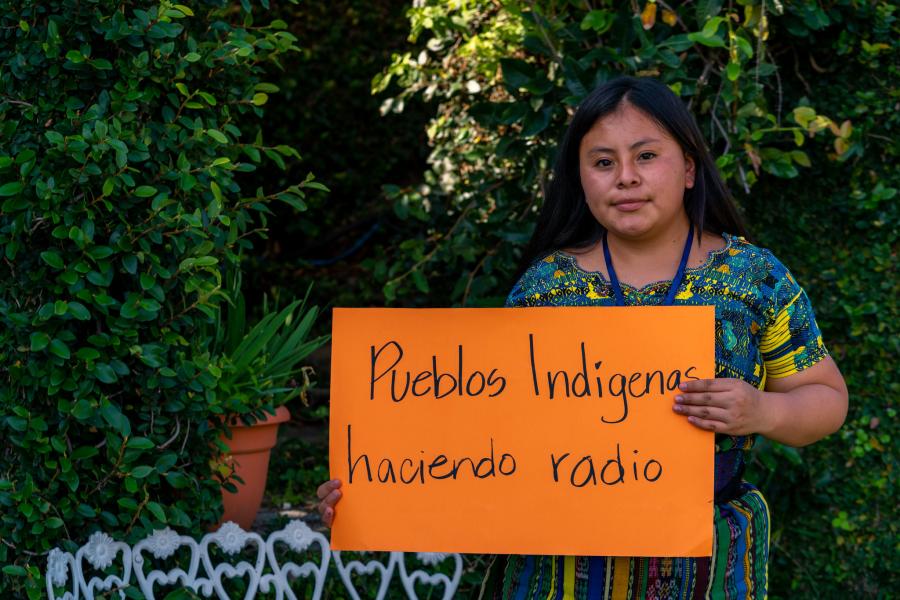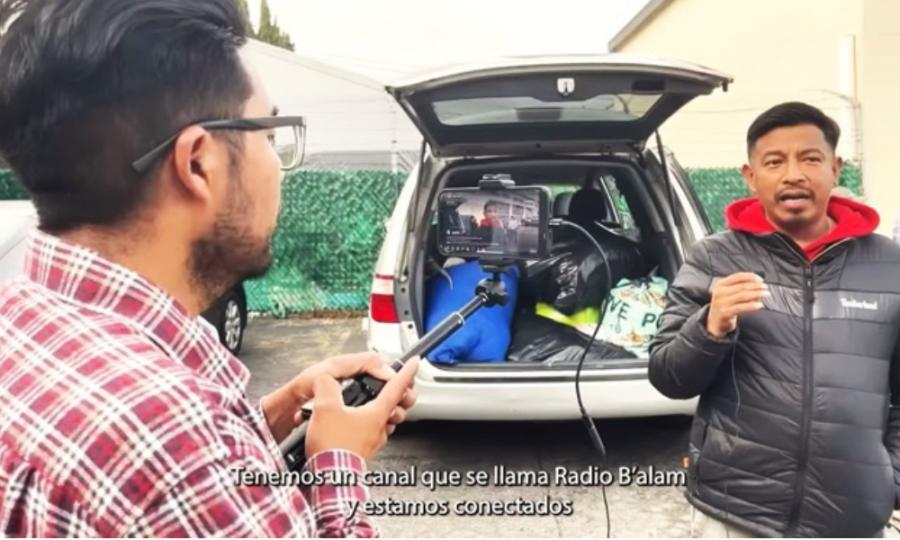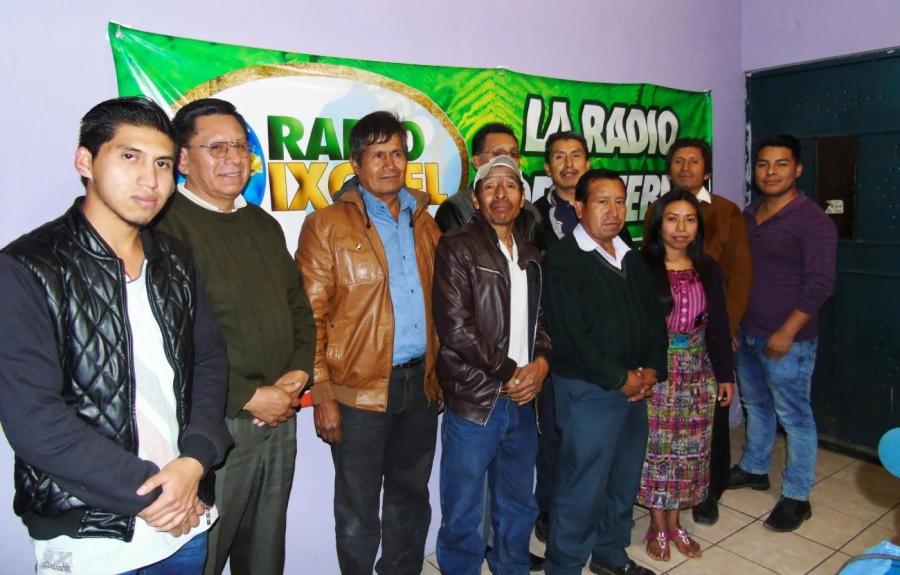
On July 7–8, 2012, representatives from community radio stations across Guatemala gathered in San Mateo, Quetzaltenango, at Radio Mujb’ab’l Yol (Meeting Place of Expressions) to participate in a workshop led by Cultural Survival staff exploring historical memory and the Guatemalan civil war. The armed conflict formally ended with the Peace Accords in 1996. Many of the younger participants had no memory of the civil war themselves, while those who had directly experienced the conflict had previously lacked forums in which to pass on their stories.
The workshop addressed complicated questions: How can a person heal from a trauma when any discussion about it, other than the most rudimentary recognition of its horrific events, is perpetually stifled? Even more vexing, how can a person heal, or even understand, a trauma not experienced firsthand? One way to begin answering these questions was via self-expression. After
a morning of factual presentations, participants spent an afternoon writing poetry in exploration of their personal relationship to the conflict.
Another session explored a new question: How could such vast and difficult experiences be contained by language? Before beginning their poems, the group read two published poems by Indigenous Guatemalan poets Humberto Ak’abal (K’iche) and Gaspar Pedro Gonzales (Q’anjobal) touching on topics of conflict and loss. They discussed the ways each poet had used poetic language to convey emotional resonance more effectively than a simple description of facts could have, and then responded individually to creative prompts inviting similar poetic expression.
Each poet presented their poem to the group for feedback. The finished poems were then recorded for radio broadcasting and collected for publication. These moving words capture the complex relationships between present and past, between personal experience and collective, between love and grief, between history and memory.
— Cassandra Euphrat Weston was an intern over the summer with Cultural Survival’s Guatemala Radio Project.
Untitled
Ana Luisa Catalino (Mam)
Stereo Acodim, Nampix Ixtahuacán,
Huehuetenango
Atzan tuj paxil jatuma ateqa xnaq b’ix
x’uj aq’nal xjal. Tuj chik’ul b’ix
tze’ nchi tzen ixytzan ni b’ech b’ix
ikytzan ch’it nchi bitzan tuj chik’ul,
jun prim o chi kub’ b’iyon qa xjal
nchanq’in b’ix nti kyu’n ti twitz
kyil tzan o chi kub’ b’iyon—
Ikytzanjajo.
Guatemala, a country where
hard-working men and women live
in harmony,
in those mountains and forests,
smiling like the flowers in the
gardens, just like the birds with their
songs in the mountains; but one day
they killed those human beings
without knowing what they had done
Why did they have to die this way?
Untitled
Idelfonso Ambrocio (K’iche)
Radio Nojibal Stereo
Aldea La Ceiba, Suchitepéquez
At wech, inawetaj
Jaschech kin nelsax chuwach ri wulew
Jaschech kuxla’n taq winäq kkaj kkalaq’aj
ri ab’i’
Janipa’ kya b’e chuwech kin ch’awik
Ruk’ ti je’lalaj ab’i’ kin k’utunsaj ri un
b’antajik
Tz’ikin rech ri uwakaj ka kikamsajkib’
Pataq ri k’achelaj kintawi ri oq’ej kech
ri e qati’t qa mam
Ruk’ ri ab’i’ kin ya ri un k’aslemal
chech ri ato’ik
You belong to me, but I don’t belong to you
Why do they invade my homeland?
Why do they want to take over your name?
When will they let me speak? I want to speak
In your beautiful name I see myself
Sometimes they kill each other born from
the same blood
Weeping is heard in the furthest corners
Of your mountains.
In your name I will give my life for
this struggle.
Nan Pix Pix
Rigoberta González Sul, Radio Ixchel
Olga Mercedes Ajcolón Tuís, Radio Juventud
Alma Temaj, Radio Doble Vía
Un pedazo de tierra
con árboles, montes y un
hermoso tanque de agua
El lugar mas hermoso
del mundo, donde sólo
los pájaros y los animales
lo habitan uno que otras
casas de adobe y pajón.
Pero llegó aquel día
en que el cerro Pix Pix
gritaba, lloraba, auxiliaba
ante los balazos que
mataba una por una a su gente.
Aquellos niños, aquellos ancianos
miraban el atardecer, al sol
esconderse con lágrimas en los ojos.
Pensando a donde ir, a refugiarse por
el temor, en los hermanos con un
fusil en la mano
sin saber ¿qué pasará mañana?
A piece of land
with trees, mountains and a
beautiful cistern of water
The most beautiful place
in the world, where only
the birds and the animals live,
houses of adobe and straw
here and there.
But the day came
when the pig Pix Pix
screamed, wept, cried for help
before the bullets that
killed its people one by one.
The children, the elders
watched the late afternoon, watched
the sun hide with tears in its eyes.
Thinking of where to go, of taking refuge
out of fear, of the brothers with a
rifle in hand
without knowing, what will happen
tomorrow?



